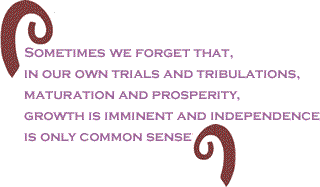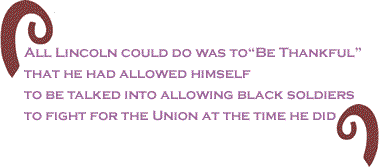
|
|||||||||||||||||||||
 |
|||||||||||||||||||||
 |
|||||||||||||||||||||
 |
|||||||||||||||||||||
 |
|
|
“These are the times that try men’s souls.” This was the opening sentence of Thomas Paine’s 1776 pamphlet, Common Sense, advocating for the colonies to declare themselves independent of Britain. What made Common Sense such a prophetic document was that it recounted the growth, the hardships and the blessings the colonies had endured in the 170 years since the founding of Jamestown in 1607. Sometimes we forget that, in our own trials and tribulations, maturation and prosperity, growth is imminent and independence is only common sense. Particularly in trying times, it’s hard to see our blessings. We’re about to get “caught up” in the rhetoric we call “the holiday season,” for which Thanksgiving Day is the gateway to a nearly 40 day celebration—for which most of us will forget the reason. Some will use it to shirk work and party all the time. Others will use it as a period of reflection of where they are in their lives, while others still will use it get themselves in useless debt for another year as “stuff” because the reason for the season. Then there’s the Jesus thing…but Jesus was born in March. Still, we don’t allow ourselves to be troubled with major details. Americans, as the war has shown, are not ones to allow the facts to get in the way of a good lie…and so it is with the holiday season, as we get bombarded with images of turkeys, pilgrims and fat men in red suits. Before we all get lost in the madness of the season, I have two words of advice for us all to stay rooted in humility, spirituality and common sense. Those two words are: “Be Thankful”. The holiday season in America is about decadence
and commercial glutton-ism. We not only get caught up in the wrong
spirit, we get lost in that spirit. We lose the meaning of these
holidays, and we lose the purpose of these holidays. Ask anybody
how the modern day Thanksgiving Day came about and they’ll
take you back to Pilgrims and Indians, turkeys and harvests, and
a whole bunch of nonsense. Certainly, that’s a more convenient
spin than the real story (particularly if you ask the Native Americans),
but the modern day celebration (the last Thursday of November) had
nothing to do with any of that. The modern day Thanksgiving celebration
came about in 1863, after President Lincoln had (finally) relented
to allow Blacks to fight for the Union. The tide
The point is that we can’t get caught up in the holiday “rope-a-dope.” Many people will be pressured in to believing they aren’t worthy because they don’t have what others have, and can’t buy what others buy, or can’t go where other people go for the holidays. Others will succumb to the pressures of overspending and overindulging. Many will lose track of their blessings, trying to count what they see as other people’s blessings. Depression goes up five fold during the so-called “happy time of the year.” Why? Because happiness is tied to “stuff,” fluff, and bluff. Regardless of our situation, we all have things to be thankful for. I’ll give you five:
Don’t get caught up in stuffing yourself these holidays. Don’t get caught in the fluff of party pretentiousness that has little significance or meaning. And don’t get bluffed by the commercializers and the money changers that tell you, “You need their stuff, you’re less without it, and you need it NOW,” to separate you from your money during the holidays and leave you in debt for the rest of this year and most of next year. It’s a trick, don’t fall for it. Instead, just keep your mind fixed on what’s real, the true meanings of the season, and don’t forget to just be thankful. That’s how you survive the holiday madness in America. Anthony Asadullah Samad is a national columnist, managing director of the Urban Issues Forum and author of 50 Years After Brown: The State of Black Equality In America. He can be reached at AnthonySamad.com. |
|
| Home | |
Your comments are always welcome. Visit the Contact Us page to send e-Mail or Feedback or Click here to send e-Mail to [email protected] e-Mail re-print notice
If you send us an e-Mail message we may publish all or part of it, unless you tell us it is not for publication. You may also request that we withhold your name. Thank you very much for your readership. |
|
| November 23, 2006 Issue 207 |
||||||||||||||
|
||||||||||||||
 |
||||||||||||||
|
||||||||||||||
| Printer Friendly Version in resizeable plain text format | ||||||||||||||
 |
||||||||||||||
 |
||||||||||||||
 |
||||||||||||||
 |
||||||||||||||
| |
||||||||||||||
| |
||||||||||||||






























